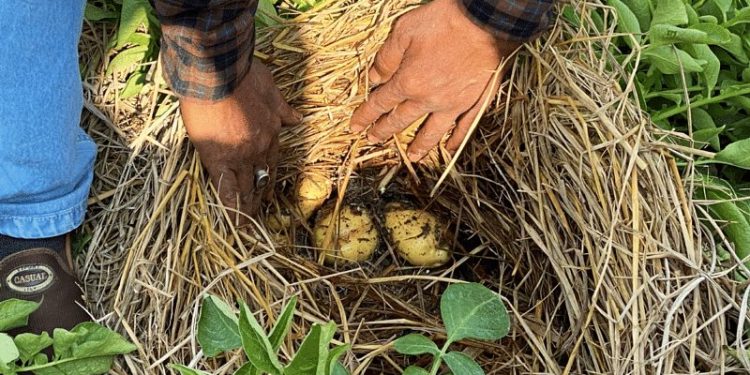#PotatoFarming #SustainableAgriculture #ZeroTillage #RiceStrawMulch #ClimateChangeResilience #InnovationinAgriculture #GlobalFarmingPractices #SustainableIntensification #UnitedNationsSDGs #CommunityEmpowerment.
In the heart of Bihar, India, the International Potato Center (CIP) has unveiled a pioneering project— “Zero Tillage Potato Production through Rice Straw Mulch (PZTM).” Implemented by the Fund for the Promotion of Innovation in Agriculture (i4Ag), this initiative marks a paradigm shift in potato farming.
The innovative technique employs zero tillage, planting potatoes directly into unworked soil and covering them with rice straw after the rice harvest. This groundbreaking approach not only eliminates the need for conventional soil preparation but also ensures a more eco-friendly and efficient farming process.
The impact of PZTM extends beyond India, reaching major potato-growing countries such as Bangladesh, Cambodia, and Peru. Designed to tackle challenges like land degradation, water scarcity, and climate change, the project is changing the game for potato farmers worldwide.
In a 2020 field-scale trial near Glenboro, Manitoba, positive results were observed for reduced-tillage potato production. Chad Berry, in collaboration with Simplot Canada, compared conventional spring tillage with direct-seeded potatoes, showcasing no significant impact on yield or quality. The benefits are evident—enhanced soil fertility, increased carbon stocks, and an extended potato growing season.
One of the project’s key strengths lies in its collaborative approach. International organizations, NGOs, and national research institutes join hands to empower smallholders, incorporating gender-sensitive trainings to ensure inclusivity. From women’s self-help groups in India to “Nutrition Scholars” in Bangladesh, the PZTM project promotes knowledge sharing and community empowerment.
The environmental benefits are noteworthy. Zero tillage enhances soil fertility, increases carbon stocks, and extends the potato growing season by utilizing moisture after rice harvest. Rice straw, used as mulch, conserves water and suppresses weeds, pests, and diseases, reducing dependence on harmful agrochemicals.
As a beacon of sustainability, the PZTM project aligns with the United Nations’ Sustainable Development Goals (SDGs). By promoting sustainable agriculture, reducing poverty, and addressing climate change, it paves the way for a brighter and more sustainable future for agricultural communities not only in India but globally.
The PZTM project signifies a transformative leap in potato farming, demonstrating the potential of sustainable practices to overcome challenges and create a prosperous future. As we witness the positive outcomes of reduced-tillage methods and innovative approaches, it becomes evident that the path to sustainable agriculture is also the path to resilience and growth.







